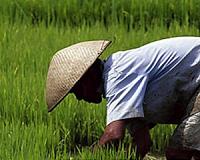 |
Ames, Iowa (SPX) Mar 03, 2011 Invasive plant species have long had a reputation as being bad for a new ecosystem when they are introduced. Stan Harpole, assistant professor of ecology, evolution and organismal biology at Iowa State University, is founding organizer of a team of more than 70 researchers working at 65 sites worldwide that tested that assumption. They wanted to know if it is true that problematic invasive species often spread widely in their new habitats because they don't encounter predators or diseases that help keep them in check in their home ranges. "There is this assumption that when plants invade a new area that they become much more abundant in the new area than they were in the native areas," said Harpole. "It turns out that, on average, they aren't any more abundant away from home than they are at home." Harpole says there is a "rule of 10s" that can apply to invasive species. "Of, say, 100 plants that arrive in a new area, only about 10 percent of those will survive without being in a greenhouse or some other controlled area," said Harpole. "Of those 10 that can survive, only about 10 percent of those really cause problems. "When you think about all the species we've brought over from other areas, relatively few have become serious pest species. The problem is we've brought over so many that quite a few have become major problems and they get a lot of attention." Harpole points to the kudzu plant as an example. Kudzu was introduced from Asia as a soil erosion plant more than a century ago. It now chokes out native species from Texas to Maine to Florida, according to the U.S. Department of Agriculture. Problem plants like this are uncommon when compared to all the exotic species in a region, but they do get the most interest and may give the impression that species that escape their home range often spread and take over new habitats and become more abundant than before, says Harpole. Invasion can also be thought of more generally as a process in which new species enter new habitats. Even plants now considered native were once invaders, says Harpole. When glaciers receded from the Midwest 10,000 years ago, there were no native species in the area - the retreating ice left bare ground open for invasion. "All the plants that are now seen as native were invasive in the past in the sense that they had to spread across the landscape," he said. "What's different today is that we move plants so much faster than they would move by themselves. Now a species can become global in a matter of years, where it may have taken tens of thousands of years in the past," said Harpole. Harpole is coauthor of a research paper led by Jennifer Firn of Queensland University of Technology, Australia, and is published in the journal Ecology Letters. Coordination of the study was funded by the National Science Foundation.
Share This Article With Planet Earth
Related Links Iowa State University Farming Today - Suppliers and Technology
 New Growth Inhibitors More Effective In Plants, Less Toxic To People
New Growth Inhibitors More Effective In Plants, Less Toxic To PeopleWest Lafayette, IN (SPX) Mar 03, 2011 A Purdue University scientist and researchers in Japan have produced a new class of improved plant growth regulators that are expected to be less toxic to humans. Angus Murphy, a professor of horticulture, said the growth inhibitors block the transport of auxin, a plant hormone that, when transported throughout the plant, controls growth processes. Current growth regulators that inhibit au ... read more |
|
| The content herein, unless otherwise known to be public domain, are Copyright 1995-2010 - SpaceDaily. AFP and UPI Wire Stories are copyright Agence France-Presse and United Press International. ESA Portal Reports are copyright European Space Agency. All NASA sourced material is public domain. Additional copyrights may apply in whole or part to other bona fide parties. Advertising does not imply endorsement,agreement or approval of any opinions, statements or information provided by SpaceDaily on any Web page published or hosted by SpaceDaily. Privacy Statement |